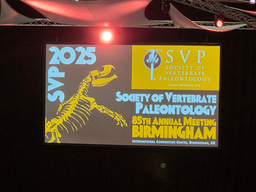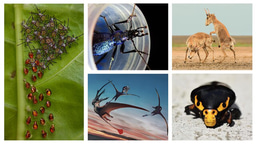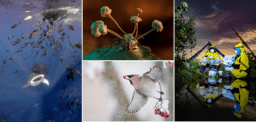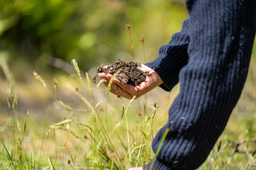Call for Papers: Plants Under Pressure: The Impact of Environmental Change on Plant Ecology and Evolution
Published in Ecology & Evolution

BMC Ecology and Evolution is calling for submissions to our Collection titled "Plants Under Pressure: The Impact of Environmental Change on Plant Ecology and Evolution."
Plants are our ancient allies, sustaining and nourishing life, yet many human actions are putting them increasingly under pressure. Worryingly, 39.4% of all plant species are now threatened with extinction, according to Royal Botanic Gardens Kew's 2020 State of the World's Plants and Fungi report. To highlight this issue and support the United Nation's Sustainable Development Goals (SDGs) 6: Clean water and sanitation, 13: Climate action, 14: Life below water and 15: Life on land, BMC Ecology and Evolution has launched this Collection to bring together research on:
- the impact of environmental change on plant ecology and evolution (e.g., climate and land use change),
- threats to plant survival (e.g., the introduction of invasive species, changes in consumer populations and potential consequences of plant loss to ecosystem functioning),
- halting and reversing plant biodiversity loss,
- and methods to monitor changes in plant species composition (e.g., eDNA and remote sensing).
Meet the Guest Editors
Isabel Barrio: Agricultural University of Iceland, Iceland
Dr. Isabel C Barrio is a Professor at the Faculty of Environmental and Forest Sciences at the Agricultural University of Iceland. Her research interests relate to plant-herbivore interactions in tundra ecosystems, and her research in Iceland focuses on the impacts of sheep grazing on common highland ranges. Isabel obtained her PhD in Environmental Sciences in 2010 from the University of Castilla La Mancha, and worked as a postdoctoral researcher at the University of Alberta (Canada) before moving to Iceland in 2015. Isabel is one of the founding members of the Herbivory Network and is Subject Editor for Oikos.
Alessandro Rapini: The State University of Feira de Santana, Brazil
Alessandro Rapini has a B.Sc. degree (Biology) and a Ph.D. (Biological Sciences - Botany) from the University of São Paulo. He carried out post-doctoral studies at the Royal Botanic Gardens (Kew-UK) and is currently a Full Professor at the Universidade Estadual de Feira de Santana (Brazil), where he has worked since 2002. He joined BMC in 2021 and has expertise in plant systematics, biogeography, and conservation, with a particular interest in the neotropical flora.
Submission guidelines
This Collection will consider research, database and software articles. Review articles will be considered at the discretion of the Journal’s Editor. If you would like to submit a review article, please first email Jennifer Harman <jennifer.harman@springernature.com> - the Editor of BMC Ecology and Evolution. Please note that unsolicited reviews will not be considered as per our submission guidelines.
Datasets, descriptions and short reports relevant to the Collection will be considered by BMC Research Notes as data or research notes. This type of content will be published in BMC Research Notes and included in the final collection.
Articles under consideration for publication within the collection will be assessed according to the standard BMC Ecology and Evolution editorial criteria and will undergo the journal’s standard peer-review process overseen by Guest Editors Dr Isabel Barrio (Agricultural University of Iceland, Iceland) and Dr Alessandro Rapini (The State University of Feira de Santana, Brazil).
Before submitting your manuscript, please ensure you have read our submission guidelines. Articles for this Collection should be submitted via our submission system, Snapp. During the submission process you will be asked whether you are submitting to a Collection, please select "Plants Under Pressure: The Impact of Environmental Change on Plant Ecology and Evolution" from the dropdown menu.
If accepted for publication, an article processing charge applies. Please click here to find out about our standard waiver policy.
Submission Status: Open | Submission Deadline: 22 December 2023
Follow the Topic
-
BMC Ecology and Evolution

An open access, peer-reviewed journal interested in all aspects of ecological and evolutionary biology.
Related Collections
With Collections, you can get published faster and increase your visibility.
Bioacoustics and soundscape ecology
BMC Ecology and Evolution welcomes submissions to its new Collection on Bioacoustics and soundscape ecology. By studying how animals use sound and how noise impacts them, you can learn a lot about the well-being of an ecosystem and the animals living there. In support of the United Nations Sustainable Development Goals (SDGs) 13: Climate action, 14: Life below water and 15: Life on land, the Collection will consider research on:
The use of sound for communication
The evolution of acoustic signals
The use of bioacoustics for taxonomy and systematics
The use of sound for biodiversity monitoring
The impacts of noise on animal development, behavior, sound production and reception
The effect of anthropogenic noise on the physiology, behavior and ecology of animals
Innovative technologies and methods to collect and analyze acoustic data to study animals and the health of ecosystems
Reviews and commentary articles are welcome following consultation with the Editor
(Jennifer.harman@springernature.com).
Publishing Model: Open Access
Deadline: Mar 27, 2026
Ecology of soils
BMC Ecology and Evolution invites researchers to submit their work on soil ecosystems and their implications for environmental sustainability. Soils are living, dynamic systems that support a vast array of organisms, from tiny microbes to plants and animals. They play a vital role in keeping our planet healthy by recycling nutrients, storing carbon, and helping regulate water and climate. Understanding how soil life functions and adapts is essential for tackling major environmental challenges like climate change, habitat loss, and soil degradation.
This collection of articles aims to showcase the latest research in soil ecology, emphasizing the interactions among soil organisms, biogeochemical processes, and ecosystem functions across various landscapes. We invite submissions that explore the following topics:
•Microbial and faunal diversity in soils: Patterns, drivers, and functional roles of bacteria, fungi, protists, and invertebrates
•Soil biogeochemistry and ecosystem functioning: Nutrient cycling, carbon sequestration, and soil health in both natural and managed ecosystems
•Soil-plant interactions: Rhizosphere processes, plant-microbe symbioses, and their effects on vegetation dynamics
•Land use and climate change impacts on soil communities: Responses of soil biodiversity and functions to agricultural intensification, urbanization, pollution, and climate shifts
•Soil metagenomics, phylogenetics, and functional ecology: Advances in molecular approaches for studying soil microbial and faunal communities
•Conservation and restoration of soil ecosystems: Strategies for maintaining soil biodiversity and ecosystem services in degraded landscapes
All manuscripts submitted to BMC Ecology and Evolution, including those submitted to collections and special issues, are assessed in line with our editorial policies and the journal’s peer review process. Reviewers and editors are required to declare competing interests and can be excluded from the peer review process if a competing interest exists.
This Collection supports and amplifies research related to SDG 15: Life on Land.
Publishing Model: Open Access
Deadline: Jun 02, 2026






Please sign in or register for FREE
If you are a registered user on Research Communities by Springer Nature, please sign in